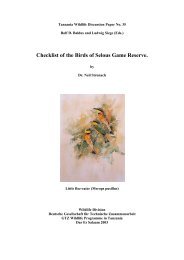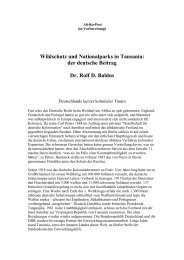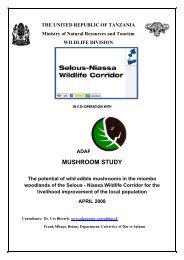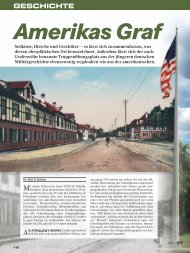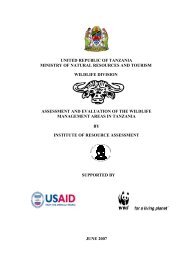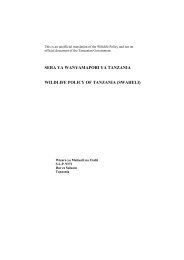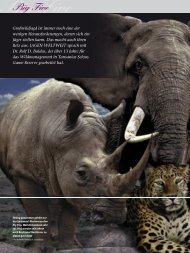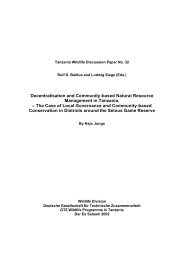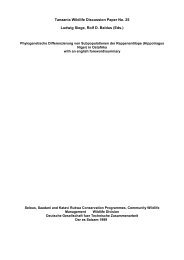African Indaba Articles - wildlife-baldus.com
African Indaba Articles - wildlife-baldus.com
African Indaba Articles - wildlife-baldus.com
You also want an ePaper? Increase the reach of your titles
YUMPU automatically turns print PDFs into web optimized ePapers that Google loves.
ecruit safari operators with a long-term interest in the sustainable ecological management of theirconcession areas. The lease period for concessions stands in direct relation to the interest of the safarioperator in sustainable management. This is in other words “Incentive Based Conservation”, where theresponsible and ethically motivated safari operator <strong>com</strong>bines his justified economic interest with his socioeconomicresponsibility, since he is willingly taking over certain conservation functions and costs.Modalities need to be worked out to achieve this noble objective, and it might be a <strong>com</strong>plex process. Thesafari hunting industry and the international hunting organizations should offer their intellectual and economicpossibilities to achieve this reform, which ultimately will benefit the people of Tanzania, their <strong>wildlife</strong> andensure the future of safari hunting in this country.The Professional Hunting Industry in South Africa: Historyand FutureBy Stewart Dorrington (Speech at the Limpopo Wildlife Expo)PHASA was established by some remarkable professional hunters, who saw the need of such anorganization some 28 years ago. These old professional hunters were in it for the love ... the love of nature,the love of outdoors and the love of hunting. It was hard to make money in those days it was more of a lifestyle. I think of names like Steve Smith, Basie Maartens, Coenraad Vermaak, Bertie Guillaume, and others,some still hunting today. We must always be grateful for what they started and the vision that they had. Wemust preserve the values that these folk established. Even 28 years ago, there were issues facing the thensmall industry. Some of these issues are being repeated again today! They were the "fly by nights" acting asoperators and fleecing clients of deposits, substandard hunts began giving SA a bad reputation as a huntingdestination. This is when the professional hunters got together and formed PHASA. They worked togetherwith government to establish regulations governing the industry whilst at the same time establishing theirown code of conduct and constitution for PHASA. The emphasis of this constitution has always been to keepthe hunting industry clean and wholesome.Little did the founding fathers know what the industry would grow to in SA. The poor economics of cattleranching and the declining value of the rand, especially during the 90s`, saw a massive growth in gameranching. This was driven by the demand for hunting, both local and trophy hunting. Having a game farmalso became a very vogue thing for many business people and investors. The demand for rare andexpensive game species took off. Big money entered the scene, from game farmers, local investors and alsofrom hunting clients, who invested in South Africa.SA became the biggest hunting destination in Africa drawing clients mostly from the USA and Europe.Professional hunting schools sprung up because Nature Conservation could not cope with the demand oftesting all the aspiring PHs. Game farms sprung up everywhere and nearly every farmer or his son became aprofessional hunter! In addition, growth was further stimulated by the increase in foreign tourists to the newSouth Africa, which resulted in more farmers going into game with the intention of capitalizing on the touristmarket. In doing this, they further increased the value of <strong>wildlife</strong>...especially the rare species.There is no doubt that professional hunting has done well for <strong>wildlife</strong> conservation in SA. It is the dynamothat drives the game ranching industry. It has seen millions of hectares being reclaimed from domestic stockfarming and put down to conservation. Not only have the species benefited, but entire stems and biodiversityin general. Oxpeckers and vultures are some of the indirect beneficiaries as well as many of the smallergame species. Even predators such as leopard have benefited from trophy hunting. A farmer will allow aleopard to consume some of his game or stock knowing that he may derive in<strong>com</strong>e if it is legally hunted.Without the potential to earn in<strong>com</strong>e, it will simply be destroyed as the cost of keeping it is too high! The antihunting lobby needs to understand this. Preservation on private property has little incentive unless there issome economic benefit. The increase in game farms has also provided the springboard to many othertourism ventures like lodges, hiking trails, 4x4 routes, etc. One could ask whether this would have happened48



